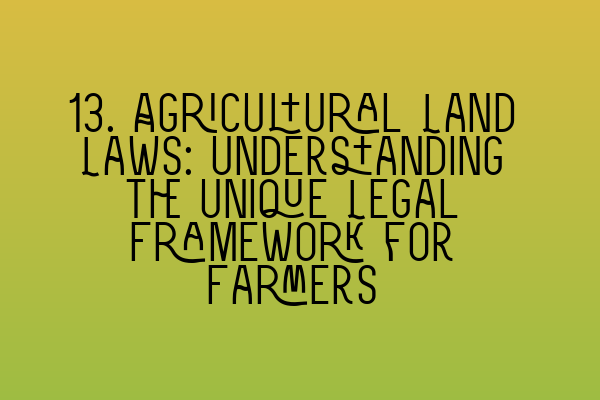13. Agricultural Land Laws: Understanding the Unique Legal Framework for Farmers
As an experienced property solicitor at SQE Property Law & Land Law, I understand the importance of staying informed about the various legal frameworks that govern different types of land ownership. In this blog post, I will be discussing the unique legal framework surrounding agricultural land and how it applies to farmers. Understanding these laws is crucial for both farmers and legal professionals in order to navigate the complexities of agricultural land ownership and ensure compliance with relevant regulations.
1. Introduction to Agricultural Land Laws
Agricultural land laws are specific regulations and statutes that govern the ownership, use, and management of land used for agricultural purposes. These laws aim to provide a stable and secure legal framework for farmers, promoting sustainable and efficient use of agricultural land while protecting the interests of landowners and the wider community.
SQE 1 Practice Mocks FLK1 FLK2
2. Key Features of Agricultural Land Laws
Agricultural land laws encompass a range of legal considerations that are specific to the agricultural sector. Some key features of these laws include:
- Zoning and Planning: Agricultural land use is often subject to zoning and planning regulations to ensure proper land use and prevent unauthorized or inappropriate development.
- Tenancy Agreements: Agricultural tenancy agreements outline the rights and responsibilities of both landlords and tenants, covering issues such as rent, maintenance, and termination of the tenancy.
- Environmental Regulations: Agricultural activities can have a significant environmental impact, and agricultural land laws often include regulations aimed at protecting the environment and promoting sustainable farming practices.
- Access and Rights of Way: Agricultural land may be subject to public rights of way or private access arrangements, and these rights need to be considered and respected in land management.
- Subsidies and Grants: Farmers may be eligible for various subsidies and grants, and agricultural land laws provide the legal framework for accessing and complying with these financial support mechanisms.
3. Legal Considerations for Farmers
For farmers, it is essential to be aware of the legal considerations and requirements that apply to their operations. Some key legal aspects that farmers should consider include:
- Ownership: Understanding the legal status and ownership of the agricultural land is crucial for farmers to ensure that they have the necessary rights and permissions to use and manage the land.
- Compliance: Farmers must comply with various legal requirements, such as environmental regulations, health and safety standards, and animal welfare laws, to avoid legal consequences and ensure sustainable agricultural practices.
- Tenancy: For farmers operating under a tenancy agreement, it is important to understand the terms of the agreement and comply with the obligations outlined within it.
- Succession Planning: Planning for the transfer of agricultural land from one generation to the next requires careful consideration of legal, financial, and taxation implications.
- Dispute Resolution: In the event of any disputes or conflicts, farmers should be familiar with the legal options available for resolving these issues, such as mediation, arbitration, or litigation.
4. Professional Guidance and Support
To navigate the complex legal framework surrounding agricultural land, it is highly recommended that farmers seek professional guidance and support from experienced property solicitors who specialize in agricultural land laws.
Professional property solicitors can provide valuable advice and assistance in various aspects, including:
- Land Ownership: Helping farmers understand their legal rights and ownership structure.
- Regulatory Compliance: Ensuring farmers are aware of and comply with relevant agricultural regulations and environmental laws.
- Tenancy Agreements: Assisting with drafting, reviewing, and negotiating tenancy agreements to protect the interests of farmers.
- Dispute Resolution: Representing farmers in case of disputes, providing guidance on legal options, and advocating for their rights.
- Succession Planning: Advising farmers on structuring their affairs to facilitate smooth succession planning and minimize inheritance tax liabilities.
In conclusion, understanding the unique legal framework surrounding agricultural land laws is vital for farmers to effectively manage their land, protect their interests, and ensure compliance with relevant regulations. Seeking professional support from property solicitors with expertise in agricultural land laws is highly recommended to navigate the complexities of this legal landscape.
SQE 1 Practice Mocks FLK1 FLK2
